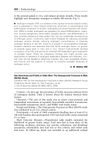Non-Competitive Androgen Receptor Inhibition In Vitro And In Vivo
January 2010
in “
Yearbook of Endocrinology
”

TLDR Two new compounds can block androgen receptor activity in different ways and may lead to new treatments for androgen-related diseases.
In the study titled "Non-competitive androgen receptor inhibition in vitro and in vivo," researchers investigated the effects of two non-competitive androgen receptor (AR) inhibitors, pyrvinium pamoate and harmol hydrochloride, on AR activity. These compounds were found to work through unique mechanisms and were shown to synergize with competitive antagonists to disrupt AR activity. Harmol hydrochloride blocked DNA occupancy by AR, while pyrvinium pamoate inhibited AR-dependent gene expression and induced prostate atrophy in vivo. The study, which included experiments on mice treated with these compounds, suggested new therapeutic strategies for inhibiting AR activity. The findings could lead to new treatments for androgen-dependent diseases and disorders, but clinical trials are needed to assess their efficacy and toxicity compared to current therapies.




